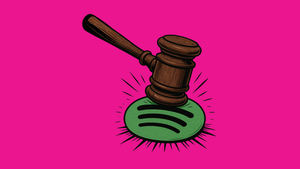Spotify is facing yet another class action lawsuit in the US, and this time it’s being sued by a disgruntled user who says they are being tricked into listening to Drake and Justin Bieber by Spotify’s “deceptive” algorithmic technology.
The new lawsuit takes aim at Discovery Mode, the service which allows artists and labels to influence the Spotify algorithm in return for accepting a discount on any royalties generated by subsequent streams.
There has been a fair amount of criticism of Discovery Mode from within the music industry, with many critics saying that it’s just a modern version of good old fashioned payola, the once widespread and long banned practice of bribing DJs and radio stations in the US to guarantee radio airplay.
The new lawsuit, filed by Spotify subscriber Genevieve Capolongo, runs with that comparison. Discovery Mode “represents the latest form of payola in the industry’s long history of deceptive pay-for-play”, it states. However, it adds, “Spotify’s version of payola stands out” because “Spotify charges listeners for the privilege of being deceived”.
It’s the second class action filed against Spotify in the space of a week, following rapper RBX’s lawsuit accusing the streaming service of turning a blind eye to streaming fraud to the detriment of artists and labels.
Maybe with Spotify finally turning the corner of profitability - with operating profits of nearly €1.5 billion so far this year - lawyers are starting to see opportunities to cash in by turning long standing grievances into fee-earning litigation.
Given all good things come in threes, we should get together and decide what other Spotify annoyances could make for a nice class action lawsuit. Maybe someone could take aim at the continued pretence that Spotify Wrapped is anything other than a cynical attempt to trick users into saturating social media with tedious insights into their ‘unique’ listening habits and giving Spotify millions of dollars of free advertising?
As well as providing a potted history of the grubby business of payola in the US - and the various attempts by regulators to stamp it out - Capolongo’s lawsuit tries to explain why Discovery Mode has negatively impacted on her listening experience as a Spotify user.
In doing so, a Spotify spokesperson has already insisted, she and her legal team have shown fundamental “misunderstandings” of how Discovery Mode works.
The lawsuit claims that Capolongo found that the “personalised listening experience” she was promised by Spotify fell short of expectations, with musical recommendations and personalised playlists “that bore little resemblance to her listening habits”.
She then blames all that on Discovery Mode, reckoning that her experience was negatively impacted because Spotify was “secretly selling those recommendations to the highest bidder”.
Spotify’s spokesperson says Capolongo's lawsuit is “riddled with misunderstandings and inaccuracies”, mainly by greatly exaggerating the impact of Discovery Mode on what music is pushed to any one user by the service’s algorithm. “Discovery Mode isn’t used in all algorithmic playlists, or even Discover Weekly or DJ, as the lawsuit claims”, they add.
Capolongo also complains that, because of Discovery Mode, she had more major label music in her recommendations. But, says Spotify, “It’s wrong to suggest Discovery Mode only supports major label artists. In fact, it’s been widely embraced by the independent music community, many of whom have praised the programme publicly”.
Which is true. Though many in the indie community have also criticised Discovery Mode, albeit for different reasons. Mainly that artists and labels shouldn't have to take a hit on their royalties to influence the algorithm, rather than because of what it does or does not do to the user experience.
Spotify will presumably present its arguments in more detail when formally responding to the latest class action lawsuit, as well as explaining why Capolongo’s specific legal claims that it is liable for false advertising, fraudulent inducement and unjust enrichment are also invalid.
Assuming the lawsuit proceeds, we could get some interesting insights into how Discovery Mode works and how the Spotify algorithm is impacted when tracks are put into Discovery Mode. And why every time you open Spotify you get pushed a Drake track whether you like it or not.

